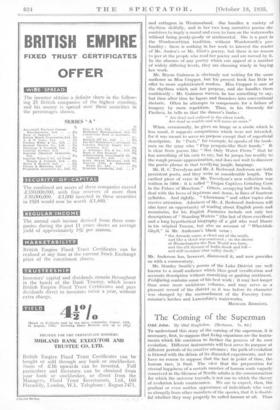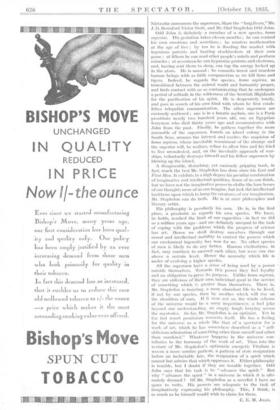The Coming of the Superman
Odd John. By Olaf Stapledon. (14Iethuen. 7s. 43d.) .
To understand this story of the coming of the superman, it is necessary, first, to suppose that living organisms are the instru ments which life contrives to further the process of its own evolution. Different instruments will best serve its purpose at different periods of its creative advance ; the path of evolution is littered with the debris of its discarded experiments, and we have no reason to suppose that the last in point of time, the human race, is final. The view that the preparation for eternal happiness of a certain number of human souls vaguely Conceived in the likeness of Nordic adults is the consummation for which the universe travails, is not one to which the theory of evolution lends countenance. We are to expect, then, the gradual or even sudden appearance of individuals who vary so abruptly from other members of the species, that it is doubt- ful whether they may properly .be called human at all. Titus Nietzsche announces the superman, Shaw the "long livers," Mr. J. D. I3eresford Victor Stott, and Mr. Olaf Stapledon Odd John.
Odd John is definitely a member of a new species, home superior. His gestation takes eleven months ; he can control his own emotions and secretions ; he masters mathematics at the age of five ; by ten he is flooding the market with ingenious patents and beating stockbrokers at their own game ; at fifteen he can read other people's minds and perform miracles; at seventeen he can hypnotise protons and electrons, and, having sent them to sleep, can tap the energy locked up in the atom. He is amoral : lie commits incest and murders human beings with as little compunction as we kill lions and tigers. Indeed, he regards the species, home sapiens, as transitional between the animal world and humanity proper, and finds contact with us so contaminating that he undergoes a period of solitude in the wilderness of the Scottish Highlands for the purification of his spirit. He is desperately lonely, and goes in search of his own kind with whom he first estab- lishes telepathic communication. The other supermen are curiously scattered ; one is in a lunatic asylum, one is a Paris prostitute nearly two hundred years old, one an Egyptian ferryman who died thirty years ago and communicates with John from the past. Finally, he gathers together the more amenable of the supermen, founds an island colony in the South Seas, arouses the interest and excites the suspicion of home sapiens, whose inevitable resentment of the strange and the superior will, he realises, refuse to allow him and his kind to live unmolested, and, on the inevitable approach of war- ships, voluntarily destroys himself and his fellow supermen by blowing up the island.
A disagreeable, disturbing, yet curiously gripping book, in fact, much the best Mr. Stapledon has done since his Last and First Men. It exhibits in a high degree his peculiar combination of imaginative and intellectual qualities. Some of us can think, but we have not the imaginative power to clothe the bare bones of our thought; more of us can imagine, but lack the intellectual backbone upon which to hang the creatures of our imagination. Mr. Stapledon can do both. He is at once philosopher and literary artist.
His philosophy is peculiarly his own. He is, in the first place, a pessimist as regards his own species. We have, he holds, reached the limit of our capacities—in fact we did so a million years ago—and are definitely unequal to the task of coping with the problems which the progress of science has set. Hence we shall destroy ourselves through our moral and intellectual inability to control the powers which our mechanical ingenuity has won for us. No other species of men is likely to do any better. Human civilisations, in fact, may continue to succeed each other, but none can rise above a certain level. hence the necessity which life is under of evolving a higher species.
All the supermen haVe ti sdrise of being used by a power outside themselves. . ToWards this power they feel loyalty and an obligation to serve its purpose. Unlike home sapiens, they arc oblivious of their own individual good in the service of something which is. greater than themselves. There is, Mr. Stapledon is insisting, a more abundant life to be lived, if not by our species, then by another which will rise on the shoulders of ours. If it were not so, the whole scheme of the universe would be a sorry impertinence, a bad joke beyond our understanding, an empty laugh braying across the mysteries. So far, Mr; Stapledon is an optimist. Yet in the last resort pessithism reasserts itself. He has a feeling for the universe as a whole like that of a spectator for a work of art, which he has somewhere described as a " self- oblivious admiration of something other than oneself and other than mankind." Whatever happens in the universe con- tributes to the harmony of the work of art. Thus into the texture of "Mr. Stapledon's optimistic energetic Vitalism is woven a more sombre pattern, a pattern of stoic resignation before an ineluctable fate, the resignation of a spirit which cannot but admire that which oppresses it.' Either philoiophy is tenable, but I doubt if they are tenable together. Odd John says that his task is to.:' advance the spirit." But why " advance the spirit " in a universe in which it is ulti- mately doomed ? Of Mr. Stapledon as a novelist I have no space to write. His powers are adequate to the task of imaginatively expressing his philosophy. This, I think, is as inueti as lie himself would wish to claim for them.
C. E. M. JOAD,



























































 Previous page
Previous page